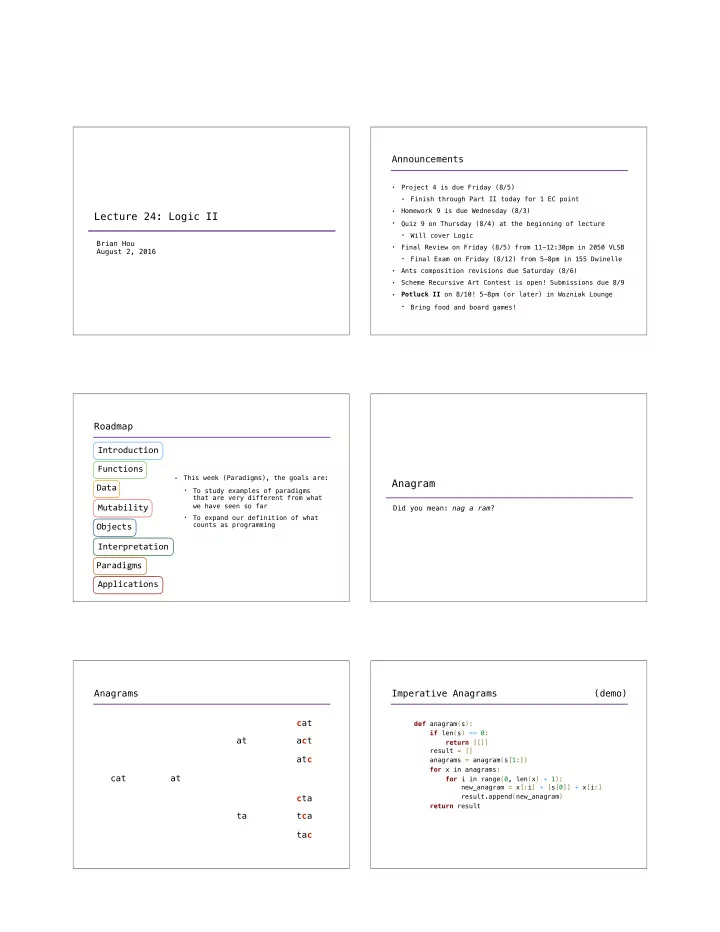

Announcements Project 4 is due Friday (8/5) • Finish through Part II today for 1 EC point • Homework 9 is due Wednesday (8/3) • Lecture 24: Logic II Quiz 9 on Thursday (8/4) at the beginning of lecture • Will cover Logic • Brian Hou Final Review on Friday (8/5) from 11-12:30pm in 2050 VLSB • August 2, 2016 Final Exam on Friday (8/12) from 5-8pm in 155 Dwinelle • Ants composition revisions due Saturday (8/6) • Scheme Recursive Art Contest is open! Submissions due 8/9 • Potluck II on 8/10! 5-8pm (or later) in Wozniak Lounge • Bring food and board games! • Roadmap Introduction Functions This week (Paradigms), the goals are: • Anagram Data To study examples of paradigms • that are very different from what we have seen so far Mutability Did you mean: nag a ram ? To expand our definition of what • counts as programming Objects Interpretation Paradigms Applications Anagrams Imperative Anagrams (demo) c at def anagram(s): if len(s) == 0: at a c t return [[]] result = [] at c anagrams = anagram(s[1:]) for x in anagrams: cat at for i in range(0, len(x) + 1): new_anagram = x[:i] + [s[0]] + x[i:] result.append(new_anagram) c ta return result ta t c a ta c
Declarative Anagrams (demo) logic> (fact (insert ?a ?r (?a . ?r))) Palindromes logic> (fact (insert ?a (?b . ?r) (?b . ?s)) (insert ?a ?r ?s)) logic> (fact (anagram () ())) logic> (fact (anagram (?a . ?r) ?b) (anagram ?r ?s) (insert ?a ?s ?b)) logic> (query (anagram ?s (s t a r))) Palindromes (demo) Declarative Programming • A palindrome is a sequence that is the same when read • In declarative programming, we tell the computer what a backward and forward solution looks like, rather than how to get the solution • Examples: "racecar", "senile felines", "too hot to hoot" • If we describe a solution in two different ways, will the computer take the same amount of time to compute a solution? logic> (fact (palindrome ?s) • Probably not... (reverse ?s ?s)) logic> (fact (reverse () ())) logic> (fact (reverse (?first . ?rest) ?rev) (reverse ?rest ?rest-rev) (append ?rest-rev (?first) ?rev)) Reverse (demo) logic> (fact (reverse () ())) logic> (fact (reverse (?first . ?rest) ?rev) (reverse ?rest ?rest-rev) Break! (append ?rest-rev (?first) ?rev)) logic> (fact (accrev (?first . ?rest) ?acc ?rev) (accrev ?rest (?first . ?acc) ?rev)) logic> (fact (accrev () ?acc ?acc)) logic> (fact (accrev ?s ?rev) (accrev ?s () ?rev))
Number Representation • Logic does not have numbers, but does have Scheme lists • Let's create our own number representation! Arithmetic • We'll limit ourselves to non-negative integers • We can represent the numbers • 0, 1, 2, 3, ... as • 0, (+ 1 0), (+ 1 (+ 1 0)), (+ 1 (+ 1 (+ 1 0))), ... • This is still a symbolic representation! Logic doesn't know that these are Scheme expressions that would evaluate to that number Addition (demo) Multiplication (demo) • Mathematical facts: • Mathematical facts: • 0 + n = n • 0 * n = 0 • In order for (x + 1) + y = (z + 1) to be true, x + y = z • In order for (x + 1) * y = z to be true, x * y + y = z logic> (fact (+ 0 ?n ?n)) logic> (fact (* 0 ?n 0)) logic> (fact (+ (+ 1 ?x) ?y (+ 1 ?z)) logic> (fact (* (+ 1 ?x) ?y ?z) (+ ?x ?y ?z)) (+ ?xy ?y ?z) logic> (query (+ (* ?x ?y ?xy)) (+ 1 (+ 1 (+ 1 0))) logic> (query (* (+ 1 (+ 1 (+ 1 0))) ?y (+ 1 (+ 1 0)) (+ 1 (+ 1 (+ 1 (+ 1 (+ 1 (+ 1 0)))))))) ?z)) Subtraction and Division (demo) Arithmetic (demo) • Mathematical facts: • We've implemented the four basic arithmetic operations! • Subtraction is the inverse of addition • We can now ask Logic about all the different ways to compute the number 6 • In order for x - y = z, y + z = x • Division is the inverse of multiplication • In order for x / y = z, y * z = x (assuming x is divisible by y) logic> (query (?op ?arg1 ?arg2 (+ 1 (+ 1 (+ 1 (+ 1 (+ 1 (+ 1 0)))))))) logic> (fact (- ?x ?y ?z) (+ ?y ?z ?x)) logic> (fact (/ ?x ?y ?z) (* ?y ?z ?x))
Summary • Some problems can be solved more easily or concisely with declarative programming than imperative programming • However, just because the computer is the one solving the problem doesn't mean that we can write any declarative program and it will "just work" • As declarative programmers, we (eventually) should understand how the underlying problem solver works • This semester, just focus on writing declarative programs; no need to worry about the underlying solver yet!
Recommend
More recommend